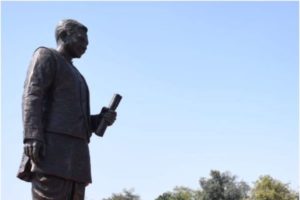
Prime Minister Narendra Modi, in his speech at United Nations General Assembly (UNGA) on Saturday, invoked RSS thinker Deendayal Upadhyaya by saying India was moving forward on the principle of “antyodaya – meaning where no one is left behind”.
On Pandit Deendayal’s 105th birth anniversary, observed as Antyodaya Diwas across India, PM Modi paid tribute to the right-wing Hindutva thinker by saying at the UNGA: “Development should be all-inclusive, universal and one that nurtures all.”
ANTYODAYA, A PART OF INTEGRAL HUMANISM
Antyodaya, one of the core principles of integral humanism, is seen as one of the driving forces behind the ethos of the BJP. Included in the concept of integral humanism, drafted by BJP-precursor Jan Sangh founder Pandit Deendayal, antyodaya quite rightly means uplifting the poorest, most deprived sections of the society.
Pandit Deendayal’s integral humanism was adopted by the Jan Sangh in 1965, a year after it was presented at the Gwalior session of the Jan Sangh. It became the party’s basic philosophy, as per the BJP constitution.
Upadhyaya borrowed heavily from the Gandhian principles of sarvodaya, swadeshi and self-reliance. A mission close to Mahatma Gandhi’s heart, antyodaya is now wholly seen a Deendayal trademark.
Apart from swadeshi and self-reliance, integral humanism as a concept also brings in morality in politics.
BJP AND INTEGRAL HUMANISM
At the UNGA, the prime minister emphasised ‘aatmanirbhar bharat’ by talking about India’s Covid-19 vaccine innovation as well as manufacturing. A self-reliant India was Upadhyaya’s dream when the country began its development journey after independence.
It is not surprising then that many of the BJP’s schemes since it came to power in 2014 are then based on the principle of antyodaya, as claimed by the party’s leaders. From Modi’s flagship ‘Swachh Bharat Abhiyan’ to ‘Make in India’ and ‘Beti Bachao, Beti Padhao’ to ‘Open Defecation Free India’, all such schemes are designed with the purpose of outreach and inclusion.
As PM Modi noted in his UNGA speech, India’s democratic values walk hand in hand with the principle of antyodaya. He said: “Yes, democracy can deliver. Democracy has delivered. Today is the birth anniversary of Pandit Deen Dayal Upadhyaya, the proponent of ‘Ekatma manav darshan’, meaning integral humanism or the development journey taken together, the expansion from self to universe.”
He added: “It is with the principle (of ‘antyodaya’ — where no one is left behind) in mind that India is moving forward on path of integrated equitable development. Our priority is that development should be all inclusive, all pervasive, universal and one that nurtures all.”
Earlier in the day, even union home minister Amit Shah started his speech at the first cooperative conference in New Delhi by saying, “Today, on the occasion of ‘National cooperative conference’, I would like to start my speech marking the birth anniversary of Pandit Deendayal because the basic motivation of many workers like me, to come into the cooperative sector, is the policy of antyodaya of Deendayal.”
Shah said welfare of the poor and antyodaya could not be imagined without cooperatives, as it was aimed at the grassroots such as rural areas. He also talked about the relevance of the cooperative movement in today’s day and age to make India a prosperous nation.




 Driving Naari Programme launched in Chandigarh
Driving Naari Programme launched in Chandigarh






























